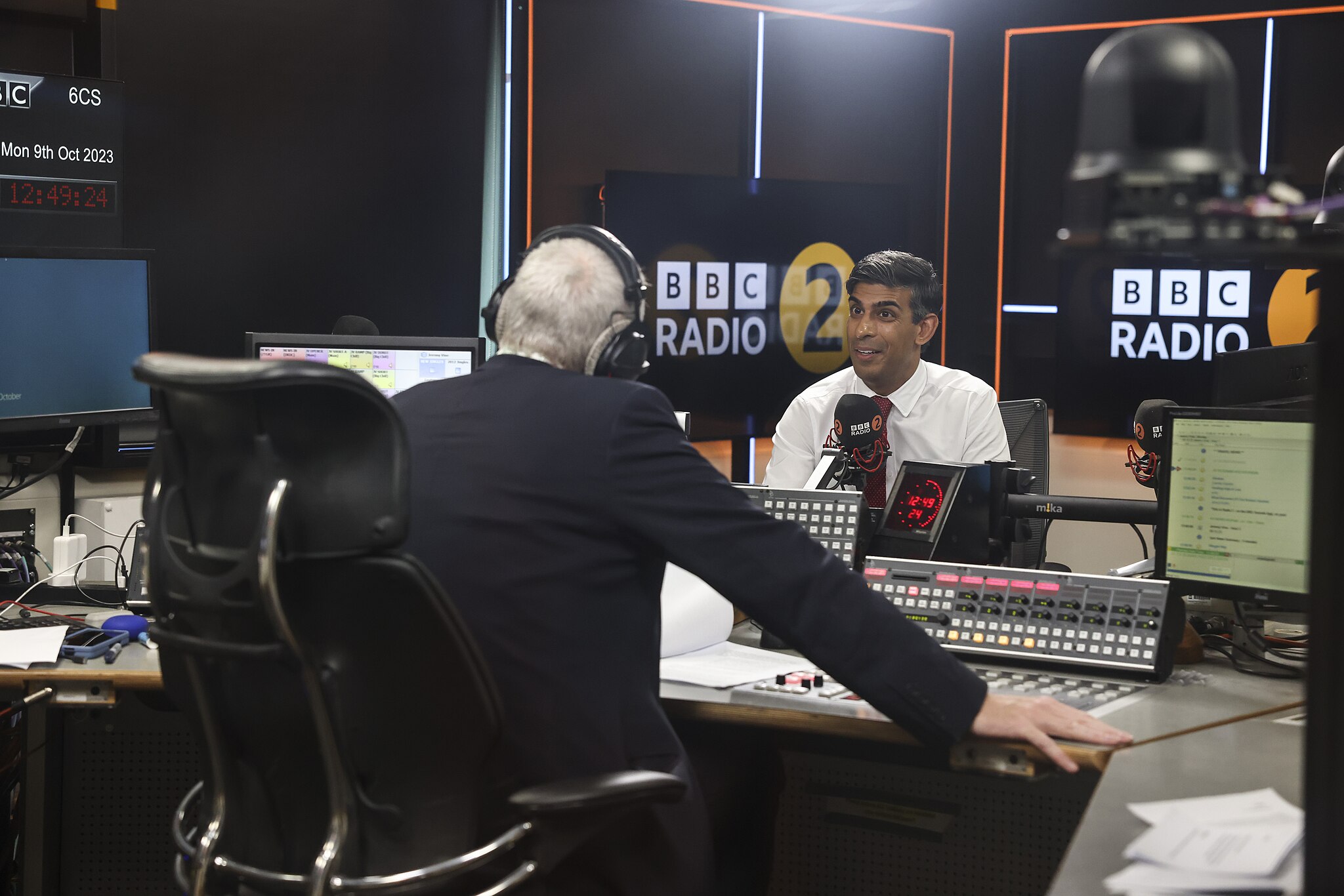This Week in Hospitality: Key Media Stories on the UK Hospitality Industry - Week 7
Posted by Emma on 25th Feb 2024 Reading Time:
Welcome to our weekly round-up, where we delve into the mainstream media's hospitality industry coverage or news that could affect hospitality.

This article is crafted to inform you about the latest news, trends, and developments in the sector. We've handpicked articles from reputable sources that shed light on the dynamic and evolving world of hospitality. Our selection criteria focus on each story's significance, relevance, and impact, ensuring a comprehensive understanding of the industry's current state.
Rishi Sunak attacks Welsh farm subsidy plans
23 February 2024, David Deans & Gwyn Loader, BBC News
 UK Prime Minister, CC BY 2.0, via Wikimedia Commons
UK Prime Minister, CC BY 2.0, via Wikimedia Commons
Conservative Prime Minister Rishi Sunak has criticised the Welsh government's proposed farm subsidy changes, labelling them "damaging" and "shocking." The controversy centres on a proposal for farmers to receive payments for maintaining trees on 10% of their land. Sunak, expressing concerns over UK food supply security, argued that these plans could jeopardise thousands of jobs, diminish food security, and harm farm incomes. During his visit to Wales, he was confronted by farmers demanding UK government intervention in Welsh agricultural budgeting. The Welsh government defends the scheme, aiming to support all farmers and stressing the maintenance of the Basic Payment Scheme at £238m in 2024 despite financial challenges. Sunak's comments came amidst broader discussions on post-Brexit agricultural policies in the UK, contrasting the approaches taken in Wales and England, with the latter focusing more on environmental policy.
Why Britain's brewers are in crisis — and your pint is costing more
17 February 2024, Oliver Gill, The Sunday Times
 Adnams Brewery by Steve Daniels, CC BY-SA 2.0, via Wikimedia Commons
Adnams Brewery by Steve Daniels, CC BY-SA 2.0, via Wikimedia Commons
The British brewing and pub sector faces a severe crisis, highlighted by the financial struggles of Adnams Brewery, a company with a legacy extending back to 1872. Soaring costs and a decline in consumer spending on outings mark this crisis. The British Beer and Pub Association notes a significant rise in the average price of a pint from £3.81 in 2019 to £4.80, with profits plummeting. Factors contributing to this dire situation include the financial aftermath of COVID-19, exacerbated by energy cost spikes following geopolitical tensions, notably Russia's invasion of Ukraine. With rising energy bills and interest rates increasing, servicing COVID-related debts has become unsustainable for many in the hospitality industry. Labour costs are also escalating, further squeezing margins. The industry calls for urgent government action to alleviate these pressures, warning of a grim future without intervention. The narrative of George Adnams' departure and eventual demise serves as a metaphor for the current perilous state of British brewers, hinting at a potential "crocodile-style death roll" for the industry without timely support.
How a taste for cheap chicken is transforming Britain
17 February 2024, Daniel Woolfson, The Telegraph
 Wikideas1, CC0, via Wikimedia Commons
Wikideas1, CC0, via Wikimedia Commons
The rapid growth of Britain's chicken industry, particularly intensive poultry production, is causing environmental and social challenges, notably in the River Wye area. The River Wye, celebrated by poets and artists, now suffers from algae growth due to nitrogen and phosphorus from chicken manure. This pollution is linked to the doubling of the chicken population in the area over the past decade, driven by the nation's increasing preference for chicken as a healthier protein alternative to red meat. Major companies like Avara Foods, supplying Tesco, have significantly contributed to this boom. Consequently, this expansion has impacted biodiversity and the housing sector, as developers face delays and additional costs due to nutrient neutrality rules. The industry's dominance by a few large companies has raised concerns over the rise of US-style mega-farms, potentially compromising the UK's food standards and increasing disease outbreak risks. Despite the negative environmental impact, the responsibility also falls on supermarkets and consumers' demands for affordable chicken, emphasising the complex challenge of balancing economic growth with ecological sustainability.
Pub bosses call on Jeremy Hunt to cut taxes as 10 close each week due to losses
20 February 2024, David Parsley, The Independent
 The Thames Pub (closed), Greenwich by canalandriversidepubs co uk, CC BY-SA 2.0, via Wikimedia Commons
The Thames Pub (closed), Greenwich by canalandriversidepubs co uk, CC BY-SA 2.0, via Wikimedia Commons
The British Beer and Pub Association (BBPA) is sounding the alarm over the closure of more than ten pubs each week, urging the government to intervene in the upcoming Budget. The BBPA's manifesto seeks a significant reduction in the industry's £15bn annual tax burden, with proposals including lowering VAT on pub food and drink, cutting business rates, and aligning beer duty with the European average. These measures aim to alleviate financial pressures on pubs, central to communities and the UK economy, supporting over 900,000 jobs and contributing £26bn in value. Still reeling from the pandemic's impact and facing high energy costs and taxes, the sector calls for a new Minister of State for Pubs and a task force to establish a sustainable tax and regulatory framework. The BBPA's demands underscore the critical situation facing pubs, with many closures attributed to unsustainable operating costs. The Treasury's response highlights recent efforts to mitigate inflation and support pubs, including a business rates discount and a freeze on alcohol duty.
It's about heart and soul
20 February 2024, Alex Bilmes, Esquire
 Matt Brown, CC BY 2.0, via Wikimedia Commons
Matt Brown, CC BY 2.0, via Wikimedia Commons
Jeremy King reminisces about transformative dining experiences in France and how these moments informed his approach to hospitality. From a spontaneous invitation to a family meal at a closed restaurant in Avignon to the casual elegance of Parisian brasseries, these experiences highlighted the difference in dining culture between France and England. King's journey through the hospitality industry began in his teenage years with modest jobs in Somerset, leading to pivotal encounters in London's dining scene. His partnership with Chris Corbin resulted in iconic establishments like Le Caprice, The Ivy, and The Wolseley, transforming London's restaurant landscape. Despite setbacks, including losing control of his business empire, King remains passionate about creating dining spaces that blend grandeur with accessibility, emphasising the importance of ambience, hospitality, and the human touch. His upcoming projects, including the revival of Simpson's in the Strand, reflect his enduring commitment to offering memorable dining experiences rooted in heart and soul.
Tyler Morse: the property tycoon turning the BT Tower into a hotel
24 February 2024, Oliver Gill, The Times
 Sebastiandoe5, CC BY-SA 4.0, via Wikimedia Commons
Sebastiandoe5, CC BY-SA 4.0, via Wikimedia Commons
Tyler Morse, a notable figure in the property sector, recently made headlines by purchasing the iconic BT Tower for £275 million with plans to transform it into a hotel, including reviving its legendary rotating restaurant. The BT Tower, a key part of London's skyline since 1965, will see the return of its dining experience that offers panoramic views of London, absent since 1971 due to an IRA bomb attack. Morse, whose company MCR owns 150 hotels across 37 US states, aims to maintain the tower's historic essence while integrating modern amenities. The project marks Morse's first hotel venture outside the US, showcasing his ambition despite the challenges of working with a Grade II listed building. Plans for the hotel include unique features like telephony-themed decor and possibly an infinity pool, reflecting Morse's approach to offering world-class, interesting products over traditional luxury. This venture adds to Morse's impressive portfolio, which includes transforming notable buildings into unique lodging experiences.
Meals on wheels are on a roll as nostalgia hits London venues
24 February 2024, Georgina Roberts, The Times
 RL0919, CC BY-SA 4.0, via Wikimedia Commons
RL0919, CC BY-SA 4.0, via Wikimedia Commons
The once-outdated trolley service is making a grand return to the London dining scene, offering a nostalgic twist to modern dining experiences. Prestigious venues like Ham Yard Hotel and Dovetale at 1 Hotel Mayfair have reintroduced this trend with various offerings, from roving pudding carts to ice cream trolleys, adding a theatrical element to dining. These trolleys, costing upwards of £27,500 each, serve as a visual and interactive treat for guests, allowing for customisation of dishes right at the table. This resurgence in trolley service is partly driven by the desire for Instagrammable moments, with diners eager to share their unique experiences online. High-end bars and restaurants have also embraced cocktail trolleys, adding an element of showmanship to the drinking experience. The trend reflects a broader revival of retro dining elements, suggesting that this old-school service style is here to stay, blending tradition with contemporary dining culture.
Fired for eating a sandwich, the cleaner who sparked a protest movement
25 February 2024, Rosie Kinchen, The Times
 James Petts from London, England, CC BY-SA 2.0, via Wikimedia Commons
James Petts from London, England, CC BY-SA 2.0, via Wikimedia Commons
Gabriela Rodriguez, a cleaner at the London law firm Devonshires, was terminated for eating a discarded tuna sandwich, igniting widespread media attention and public support. Her case against Total Clean and Devonshires for discrimination and unfair dismissal has highlighted the plight of the approximately 700,000 cleaners in the UK, many of whom are vulnerable migrants from Latin America. The resurgence in union membership among these workers, with organisations like United Voices of the World (UVW) leading the charge, represents a growing "cleaners' movement" fighting for their rights and dignity in the workplace. This movement has gained momentum, achieving significant victories such as full NHS staff status for contracted workers at St Mary's Hospital and addressing issues of unfair pay and working conditions across various sectors. Rodriguez's story sheds light on the broader challenges faced by low-paid migrant workers in the UK, signalling a potential turning point in their fight for justice and recognition.

